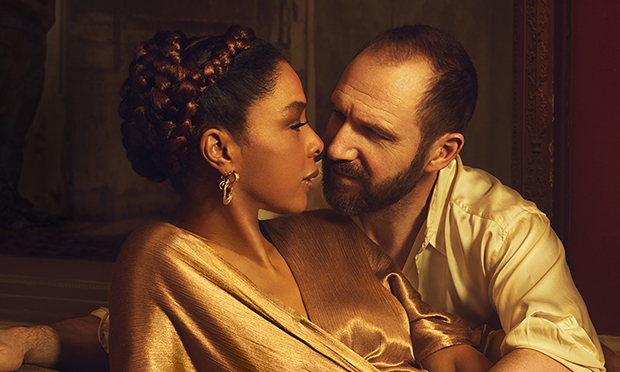Antony and Cleopatra, National Theatre Live on YouTube, stage review: ‘As long as the Nile but not quite as fertile’

Ralph Fiennes and Sophie Okonedo grapple with one of history’s most infamous doomed love affairs (not really a spoiler) in the National’s 2018 production of Shakespeare’s classic, Antony and Cleopatra.
It’s a little like Agatha Christie’s Death on the Nile but with more suicide, bloodshed and war, and fewer mild-mannered English tourists and rotund Belgian detectives.
The play loosely follows the tale of Egypt’s last pharaoh and her ill-fated second choice of boyfriend, the Roman general Mark Antony.
Star-studded and carefully modernised, this piece is resplendent if a little lacking in variety of energy.
Fiennes is arresting as the erratic and love-bound general, dominating the stage and making the long monologues feel at least engaging if not shorter.
It is with Okonedo’s interpretation of Cleopatra where the difficulty lies. Shakespeare’s freedom with facts crafts a deeply complex and problematic idea of the queen, one that historians have hotly debated. She is both childlike and tempestuous, but with the redeeming capacity for love.
Okonedo pours fire and flair into the role, but so much so that it verges on melodrama. The question is whether enough reality can be drawn from a depiction so steeped in the patriarchal myth surrounding the queen.
Maybe – and please don’t shoot the messenger! – it’s the script that’s to blame? Have we not moved past the idea of Cleopatra the harpy?
Hildegard Bechtler’s set is simple, yet nicely symbolic. The heavy use of marble and expensive furniture creates interiors like upmarket hotels, palatial but contemporary.
The idea of blue stones and subtle reed patterns to recall the verdant banks of the Nile felt a little lost. Furthermore, both the sea and land battles, pivotal in the struggle for power, fail to bring to mind the dust, blood and carnage of ancient or modern warfare.
Its Evie Gurney’s costume’s that win the day for the piece, particularly Cleopatra’s. Regal yet brimming with movement and beauty, the attire emphasises Okonedo’s aggressive physicality and unpredictability, yet grounds the queen in her ancient roots.
Setting her apart from the soldiery costumes of her fellow male rulers, her flowing dresses of rich fabrics, velvet and silk, contrast with the clean hard lines of the Roman generals in the senate scene with nice visual clarity.
This keenly situates the female monarch interestingly in a period where beauty was one of the main things women were forced to trade on.
Nice details of classical Greek chest armour keep the whole thing feeling ancient despite its modern leanings, and the naval and combat uniforms help us understand the recontextualization and nods to Somalian pirates with one costume focus that even more.
The cast as a whole is effective in creating a world torn apart by war, betrayal and egotism.
Sargon Yelda, playing a rival general Pompey, brings a comedic sense, and Tunji Kasim as Caesar is the perfect antithesis to Mark Antony’s ravings – cooler, calmer and in control.
Tim McMullan as Enobarbus is heart-wrenching in his cowardice, and Gloria Obianyo and Georgia Landers playing Cleopatra’s women bookend the queen’s fury. They provide depth and a much-needed female bond in a male-dominated world.
In the same vein, Hannah Morrish is the direct opposition to the queen as Anthony’s wife Octavia – quiet and calm.
These characters fall away because, as the title suggests, the focus therein is on the lovers and the disaster sparked by their obsession.
The piece’s intensity is dialled way up from the very start and never really changes.
Although Simon Godwin’s directing is imaginative, this lack of variety means the action rather drags and the piece loses some of its potency.
The bard is known for long death scenes but he outdoes himself in this one. Five suicides across two locations, involving a (real) snake, bring the piece to its climax.
The last images of bloodshed and pride still manage to hit home as the beautiful line ‘I have immortal longings in me’ ends the queen’s days.
This production is visually ravishing and well acted, but whether it be the fault of the now outdated view of history, or a lack of undulation, the play feels as long as the Nile yet not quite as fertile.
Antony and Cleopatra is available to watch right now on the National Theatre’s YouTube channel
To support the theatre through the coronavirus crisis, donate at nationaltheatre.org.uk or text NTATHOME 10 to 70085 to give £10
